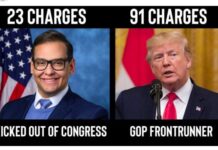When any political party takes control, it has tremendous responsibility and power. It also has to promote new people who can work with the new leader to execute policy, foster new relationships and demonstrate they can get things done.
This is also very stressful. It is a reason why many people chose to remain as part of the army of workers who do their jobs but eschew any leadership position. They are more comfortable being part of a larger organization but want to avoid the responsibility of being too visible.
This may explain the current floundering of the Democrat Party.
As of 2018, Republicans control 30 state legislatures and Democrats control 18, compared to 31 for Republicans and 14 for Democrats before the election. In 21 states, Republicans hold both the governorship and the majority legislatures. In Congress, the 2018 mid-term election saw the Republicans control the Senate, as the Democrats won a majority in the House.
Now, with a divided government going into the 2010 election, the Democrats and their Democrat Nation Committee (DNC) still control the party’s finances, direction, and its ideological pitch.
In an interview that is required for any Democrat who wants a concise history of the failure of the DNC, read this interview with Ralph Nader from 2017. As the interview in The Intercept states, Nader is blamed for causing then-Democrat presidential candidate Al Gore to lose Florida to George Bush, whose brother Jeb was then Florida governor.
The Dems War on Third Parties
Many Democrats blamed Nader for the presidential loss, even though a study of the recount process showed that Gore actually won Florida. While Bush won the electoral college but lost the popular vote, Dems still hang the loss on Nader, the leader of the Green Party.
Nader’s role as the leader of a third party gives him a special perspective. He saw how the entrenched DNC marginalized and confronted his efforts and foreshadowed how the DNC treated Bernie Sanders against the favored Hillary Clinton in 2016.
The Intercept interview with Nader shows how and when the Democrat Party changed course by abandoning policy initiatives and replaced them with corporate financial support and PAC money. The viability of any potential candidate was measured in how much money they could raise and bring into DNC coffers. Nader also said the Dems abandoned their links with working-class families and Red (Republican controlled) states and failed to develop national state-wide campaigns. This explains the Democrat losses at the state and local levels over the past decades.
Flash forward to 2016. Democrat infighting to keep Sanders from gaining more visibility and position, combined with White House inaction, and blind optimism and arrogance that Hillary would win the election, prevented Obama and the DNC from sounding the alarm about the Russian hacking.
As early as May 2016, the Democratic Congressional Campaign Committee (DCCC) and DNC become aware that their networks have been hacked. In a subsequent interview, Clinton said her campaign was aware of the Russian interference and alerted the Obama administration about the events, but the Obama administration ignored her. Hillary also said that when her campaign started, the DNC had not money, was poorly staffed and had bad research data. While this is not often discussed, the status of a party’s national administration is the responsibility of the presiding president. When Obama was president, he was responsible for improving the state of the DNC. If what Clinton says is correct, this was another Obama failure. (For a complete timeline of the Russian hacking and disinformation see The Washington Post.)
Where Was Obama?
But that was the beginning. When Obama was informed about the Russian hacking, he did two things: He asked Russian President Vladimir Putin at an international summit to stop interfering in U.S. election. Putin ignored  him. Obama then asked the-Republican Majority Leader Paul Ryan to condemn the Russian interference, but he could not get Senate Majority Leader Mitch McConnell to agree. As a result, nothing public was said by the Obama administration until October 2016, weeks before the election and well after all the damage had been done.
him. Obama then asked the-Republican Majority Leader Paul Ryan to condemn the Russian interference, but he could not get Senate Majority Leader Mitch McConnell to agree. As a result, nothing public was said by the Obama administration until October 2016, weeks before the election and well after all the damage had been done.
To many, the big question is why Obama needed Republican approval to condemn the Russian hacking in the first place. In private, Obama asked intelligence officials to conduct a cyber attack against the Russians, and according to the Washington Post, that was not done, nor would it have a major effect on the upcoming U.S. election.
Since then, Democrats have continued to move slowly. After Clinton lost the election, “the Democratic leadership on Capitol Hill was slow to call for investigations of Russia’s not-so-covert intervention and Trump’s and his campaign’s dealings with Russians. Discouraged and in disbelief, top Democrats missed the opportunity to define the election as a contest tainted by Moscow’s clandestine operation. It took months for them to issue forceful calls for investigation,” according to Mother Jones. That continues today, as seen in the simmering debate about whether to hold an impeachment vote.
And where was the DNC during the Russian hacking period? It looks like it was business-as-usual.
To date, the DNC has not issued a report on why Hillary Clinton lost the election and how she spent $1 billion in campaign funds. When I asked Congresswoman Lois Frankel (D-Fla) in 2018 about why Clinton lost the election, she said it was all due to the Russians. That certainly is not a complete answer, but it comforts the key people inside the party. Most importantly, Obama also has been silent on whey he failed to act against the hacking.
As for reforming the DNC with new ideas from progressives, such as Bernie Sanders and Elizabeth Warren, here is what Ralph Nader said about that effort:
“There are some people who think the Democratic Party can be reformed from within by changing the personnel. I say good luck to that. What’s happened in the last twenty years? They’ve gotten more entrenched. Get rid of Pelosi, you get Steny Hoyer. You get rid of Harry Reid, you get [Charles] Schumer. Good luck,” Nader said.











